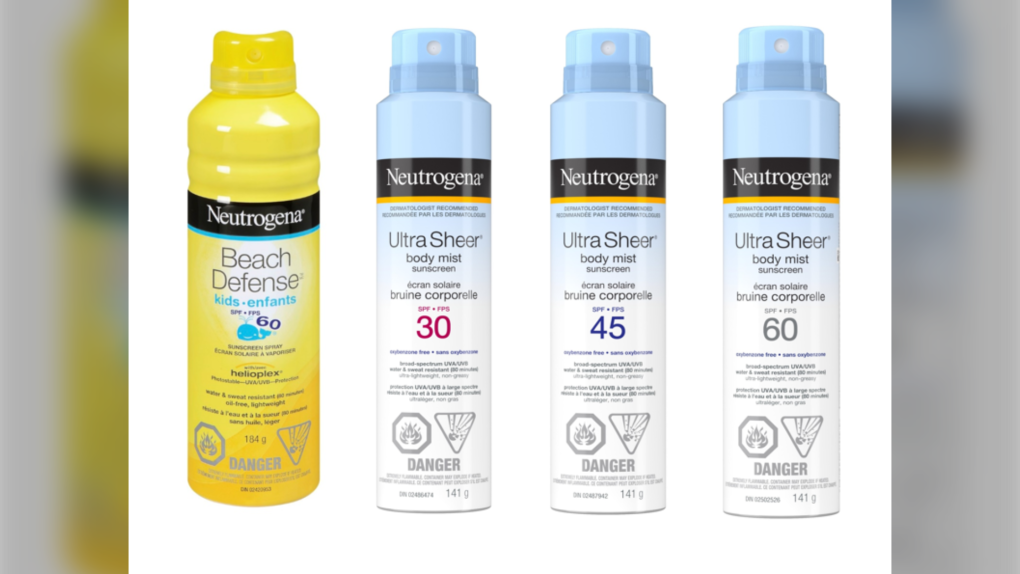Neutrogena sunscreen recalled due to elevated levels of benzene
 Neutrogena Beach Defense and Ultra Sheer sunscreens has been recalled by Johnson & Johnson Inc. due to elevated levels of benzene. July 17, 2021. (Source: Health Canada)
Neutrogena Beach Defense and Ultra Sheer sunscreens has been recalled by Johnson & Johnson Inc. due to elevated levels of benzene. July 17, 2021. (Source: Health Canada)
Health Canada is warning Canadians about a recall involving Neutrogena sunscreen.
Johnson & Johnson Inc., the parent company of Neutrogena, issued a recall for Neutrogena Beach Defense and Ultra Sheer sunscreens for adults and kids in aerosol spray.
The recall was issued because of high levels of benzene found in the sunscreen during testing.
Health Canada said benzene is something people are exposed to through the air, such as exhaust from cars or second-hand cigarette smoke.
It said there is no safe level of benzene exposure for people but long-term and repeated exposure can lead to serious health problems.
"Immediate signs of exposure to elevated levels of benzene include drowsiness, dizziness, rapid or irregular heartbeat and headaches," Health Canada said in a release.
Health Canada added long-term exposure can lead to cancer such as leukemia, anemia and bone marrow failure.
The recall affects the Neutrogena Beach Defense Kids SPF 60 Spray, as well as the Neutrogena Ultra Sheer Body Mist Sunscreen SPF 30, 45, and 60.
All the expiration dates for these products are either 2021, 2022, or 2023.
Health Canada said people should stop using the recalled products immediately and consult a doctor if they have any health concerns.
Despite the recall, Health Canada said it still strongly recommending that people use other sunscreen.
"It is important that people continue to use sunscreen to protect themselves from sun damage. Ultraviolet radiation from the sun can cause cancer and other skin effects."
CTVNews.ca Top Stories

Joe Biden pardons his son Hunter Biden on gun, tax charges, despite previous promises he wouldn't
U.S. President Joe Biden announced Sunday that he pardoned his son Hunter Biden on gun, tax charges, despite previous promises that he would not do so.
Canada Post presents union with 'framework' to reach deal as strike continues
Canada Post has presented the union representing some 55,000 striking postal workers with a framework to reach negotiated agreements, the corporation said.
'Devastating': Missing Surrey, B.C. teen found dead, family says
The family of a missing 18-year-old, who was last seen in Surrey over a month ago, says there has been a tragic end to the search.
The best tips to prepare your car for the winter
Slippery or snow-covered roads, reduced visibility and bitter cold are all conditions that can make driving difficult and even dangerous during cold weather months. CAA spoke with CTV Morning Live this week on some of the best ways you can winterize your car.
PM Trudeau 'surprised' provinces unanimous on accelerated defence spending: Ford
Ontario Premier Doug Ford says his fellow provincial leaders are united in pushing for Canada to meet its NATO defence spending targets ahead of schedule, and that Prime Minister Justin Trudeau was "surprised" to hear it.
Stellantis CEO resigns as carmaker sales continue to slump
Stellantis CEO Carlos Tavares is stepping down after nearly four years in the top spot of the automaker, which owns car brands like Jeep, Citroën and Ram, amid an ongoing struggle with slumping sales.
'Wicked' star Marissa Bode speaks out against 'harmful' ableist comments made about her character
'Wicked' actress Marissa Bode posted a video on TikTok asking for kindness after receiving ableist comments on social media.
Poilievre calls for asylum seeker cap, border plan as U.S. tariff threat looms
Conservative Leader Pierre Poilievre has demanded the federal government present a plan before Parliament to beef up border security as U.S. president-elect Donald Trump threatens to impose stiff tariffs on Canada.
Emergency crews battle large fire at Kitchener, Ont. townhouse complex
Waterloo Regional Police say Kingsway Drive will remain closed as emergency crews continue to battle a large blaze at a townhouse complex.


































